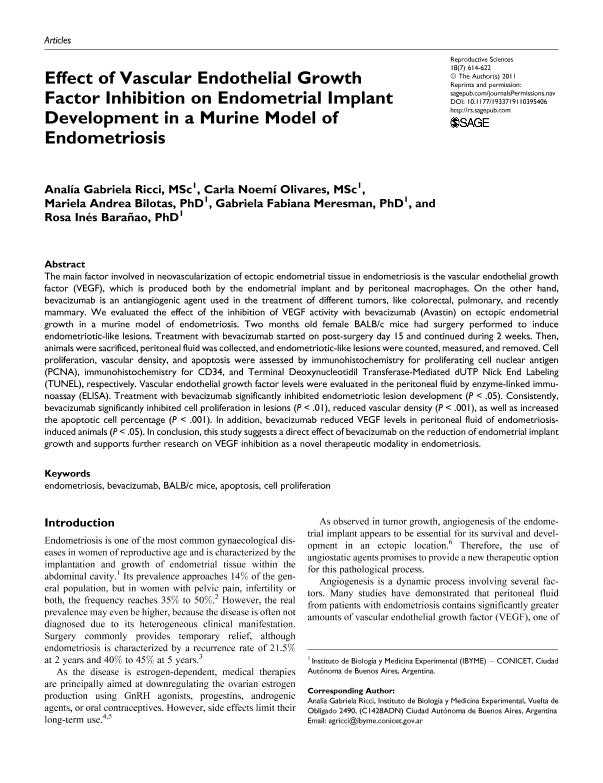Artículo
Effect of vascular endothelial growth factor inhibition on endometrial implant development in a murine model of endometriosis
Ricci, Analía Gabriela ; Olivares, Carla Noemi
; Olivares, Carla Noemi ; Bilotas, Mariela Andrea
; Bilotas, Mariela Andrea ; Meresman, Gabriela Fabiana
; Meresman, Gabriela Fabiana ; Barañao, Rosa Ines
; Barañao, Rosa Ines
 ; Olivares, Carla Noemi
; Olivares, Carla Noemi ; Bilotas, Mariela Andrea
; Bilotas, Mariela Andrea ; Meresman, Gabriela Fabiana
; Meresman, Gabriela Fabiana ; Barañao, Rosa Ines
; Barañao, Rosa Ines
Fecha de publicación:
07/2011
Editorial:
SAGE Publications
Revista:
Reproductive Sciences
ISSN:
1933-7191
Idioma:
Inglés
Tipo de recurso:
Artículo publicado
Clasificación temática:
Resumen
The main factor involved in neovascularization of ectopic endometrial tissue in endometriosis is the vascular endothelial growth factor (VEGF), which is produced both by the endometrial implant and by peritoneal macrophages. On the other hand, bevacizumab is an antiangiogenic agent used in the treatment of different tumors, like colorectal, pulmonary, and recently mammary. We evaluated the effect of the inhibition of VEGF activity with bevacizumab (Avastin) on ectopic endometrial growth in a murine model of endometriosis. Two months old female BALB/c mice had surgery performed to induce endometriotic-like lesions. Treatment with bevacizumab started on post-surgery day 15 and continued during 2 weeks. Then, animals were sacrificed, peritoneal fluid was collected, and endometriotic-like lesions were counted, measured, and removed. Cell proliferation, vascular density, and apoptosis were assessed by immunohistochemistry for proliferating cell nuclear antigen (PCNA), immunohistochemistry for CD34, and Terminal Deoxynucleotidil Transferase-Mediated dUTP Nick End Labeling (TUNEL), respectively. Vascular endothelial growth factor levels were evaluated in the peritoneal fluid by enzyme-linked immunoassay (ELISA). Treatment with bevacizumab significantly inhibited endometriotic lesion development (P <.05). Consistently, bevacizumab significantly inhibited cell proliferation in lesions (P <.01), reduced vascular density (P <.001), as well as increased the apoptotic cell percentage (P <.001). In addition, bevacizumab reduced VEGF levels in peritoneal fluid of endometriosis-induced animals (P <.05). In conclusion, this study suggests a direct effect of bevacizumab on the reduction of endometrial implant growth and supports further research on VEGF inhibition as a novel therapeutic modality in endometriosis. © The Author(s) 2011.
Palabras clave:
Apoptosis
,
Balb/C Mice
,
Bevacizumab
,
Cell Proliferation
,
Endometriosis
Archivos asociados
Licencia
Identificadores
Colecciones
Articulos(IBYME)
Articulos de INST.DE BIOLOGIA Y MEDICINA EXPERIMENTAL (I)
Articulos de INST.DE BIOLOGIA Y MEDICINA EXPERIMENTAL (I)
Citación
Ricci, Analía Gabriela; Olivares, Carla Noemi; Bilotas, Mariela Andrea; Meresman, Gabriela Fabiana; Barañao, Rosa Ines; Effect of vascular endothelial growth factor inhibition on endometrial implant development in a murine model of endometriosis; SAGE Publications; Reproductive Sciences; 18; 7; 7-2011; 614-622
Compartir
Altmétricas



